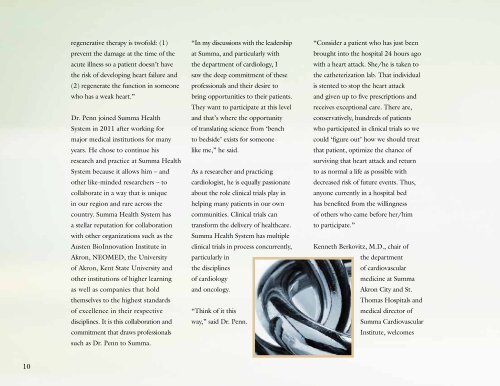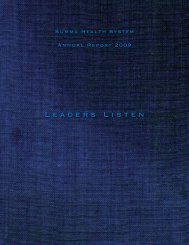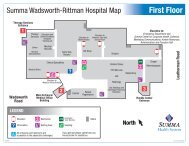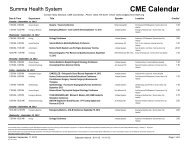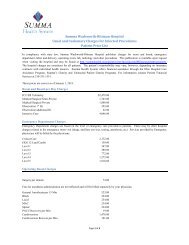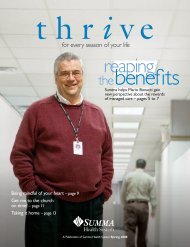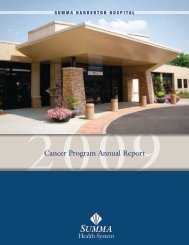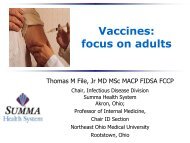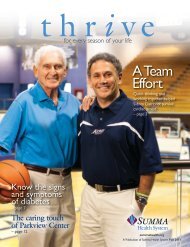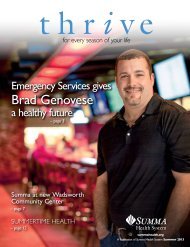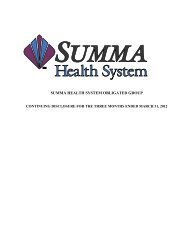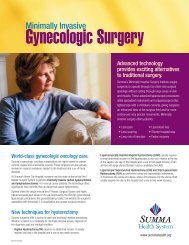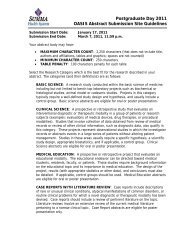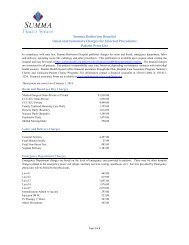2011 Annual Report - Summa Health System
2011 Annual Report - Summa Health System
2011 Annual Report - Summa Health System
Create successful ePaper yourself
Turn your PDF publications into a flip-book with our unique Google optimized e-Paper software.
egenerative therapy is twofold: (1)<br />
prevent the damage at the time of the<br />
acute illness so a patient doesn’t have<br />
the risk of developing heart failure and<br />
(2) regenerate the function in someone<br />
who has a weak heart.”<br />
Dr. Penn joined <strong>Summa</strong> <strong>Health</strong><br />
<strong>System</strong> in <strong>2011</strong> after working for<br />
major medical institutions for many<br />
years. He chose to continue his<br />
research and practice at <strong>Summa</strong> <strong>Health</strong><br />
<strong>System</strong> because it allows him – and<br />
other like-minded researchers – to<br />
collaborate in a way that is unique<br />
in our region and rare across the<br />
country. <strong>Summa</strong> <strong>Health</strong> <strong>System</strong> has<br />
a stellar reputation for collaboration<br />
with other organizations such as the<br />
Austen BioInnovation Institute in<br />
Akron, NEOMED, the University<br />
of Akron, Kent State University and<br />
other institutions of higher learning<br />
as well as companies that hold<br />
themselves to the highest standards<br />
of excellence in their respective<br />
disciplines. It is this collaboration and<br />
commitment that draws professionals<br />
such as Dr. Penn to <strong>Summa</strong>.<br />
“In my discussions with the leadership<br />
at <strong>Summa</strong>, and particularly with<br />
the department of cardiology, I<br />
saw the deep commitment of these<br />
professionals and their desire to<br />
bring opportunities to their patients.<br />
They want to participate at this level<br />
and that’s where the opportunity<br />
of translating science from ‘bench<br />
to bedside’ exists for someone<br />
like me,” he said.<br />
As a researcher and practicing<br />
cardiologist, he is equally passionate<br />
about the role clinical trials play in<br />
helping many patients in our own<br />
communities. Clinical trials can<br />
transform the delivery of healthcare.<br />
<strong>Summa</strong> <strong>Health</strong> <strong>System</strong> has multiple<br />
clinical trials in process concurrently,<br />
particularly in<br />
the disciplines<br />
of cardiology<br />
and oncology.<br />
“Think of it this<br />
way,” said Dr. Penn.<br />
“Consider a patient who has just been<br />
brought into the hospital 24 hours ago<br />
with a heart attack. She/he is taken to<br />
the catheterization lab. That individual<br />
is stented to stop the heart attack<br />
and given up to five prescriptions and<br />
receives exceptional care. There are,<br />
conservatively, hundreds of patients<br />
who participated in clinical trials so we<br />
could ‘figure out’ how we should treat<br />
that patient, optimize the chance of<br />
surviving that heart attack and return<br />
to as normal a life as possible with<br />
decreased risk of future events. Thus,<br />
anyone currently in a hospital bed<br />
has benefited from the willingness<br />
of others who came before her/him<br />
to participate.”<br />
Kenneth Berkovitz, M.D., chair of<br />
the department<br />
of cardiovascular<br />
medicine at <strong>Summa</strong><br />
Akron City and St.<br />
Thomas Hospitals and<br />
medical director of<br />
<strong>Summa</strong> Cardiovascular<br />
Institute, welcomes<br />
10


